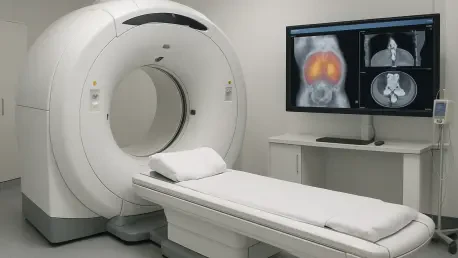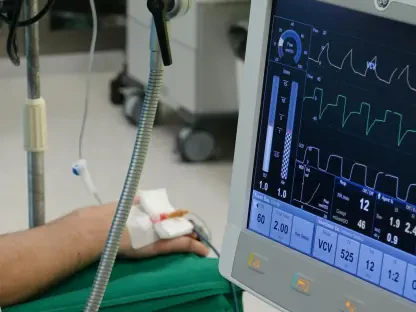In Malaysia, a silent health crisis looms as prostate cancer often goes undetected until it reaches critical stages, leaving many men with limited options for effective treatment, and statistics reveal a grim reality: nearly 75% of Malaysian men are diagnosed only after the disease has spread to bones or other organs. This rate is significantly higher than in other parts of Southeast Asia or developed nations like the United States. This delay, often due to dismissing early symptoms as mere signs of aging, underscores a dire need for better awareness and innovative solutions. Fortunately, nuclear medicine is stepping in as a transformative force, offering cutting-edge tools that enhance both diagnosis and treatment. With technologies like Prostate-Specific Membrane Antigen (PSMA) PET/CT scans and Radioligand Therapy (RLT), the landscape of prostate cancer care is shifting, providing renewed hope for patients across the country. This article explores how these advancements are reshaping outcomes and addressing long-standing challenges in the fight against this pervasive disease.
Revolutionizing Detection with Advanced Imaging
Nuclear medicine is heralding a new era in prostate cancer detection in Malaysia, primarily through the use of PSMA PET/CT scans, which offer unprecedented precision. This technology targets a specific protein overexpressed in over 80% of advanced prostate cancer cases, enabling the identification of tumors as small as 3mm, even in hard-to-detect areas like soft tissues. As highlighted by experts in the field, such as Dr. Andik Fadilah Abdul Aziz, a consultant nuclear medicine physician, this approach allows clinicians to visualize the exact spread of the disease with remarkable clarity. Unlike traditional imaging methods, which often miss smaller or hidden metastases, PSMA PET/CT provides a detailed roadmap that directly informs treatment strategies. This leap in diagnostic capability marks a significant departure from past limitations, positioning nuclear medicine as a cornerstone of early and accurate detection for Malaysian patients grappling with this illness.
The significance of this diagnostic breakthrough extends far beyond mere technical achievement, as it fundamentally alters the trajectory of patient care. For many men, receiving a precise diagnosis at an earlier stage—or understanding the full extent of an advanced case—can mean the difference between limited options and a tailored, effective plan. This clarity empowers doctors to make informed decisions, whether it’s opting for surgery, radiation, or other therapies, while giving patients a clearer picture of their condition. In a country where late-stage diagnoses are alarmingly common, the ability to “see what they treat,” as Dr. Fadilah describes, is a game-changer. It not only boosts confidence in medical interventions but also lays the groundwork for integrating nuclear medicine into routine prostate cancer screening and management, potentially reducing the burden of advanced disease over time in Malaysia’s healthcare landscape.
Targeted Treatments Offer a Lifeline
Beyond its diagnostic prowess, nuclear medicine is also redefining treatment options through innovations like Radioligand Therapy (RLT), a targeted approach that delivers radiation directly to cancer cells. By homing in on the PSMA protein, RLT minimizes damage to surrounding healthy tissues, offering a stark contrast to broader treatments like chemotherapy, which often come with debilitating side effects. This precision translates into tangible benefits for patients across Malaysia, where stories of recovery underscore the therapy’s impact. For instance, individuals who once faced severe mobility limitations due to advanced cancer have regained the ability to walk, while others have returned to cherished activities like enjoying family meals. Such outcomes highlight how nuclear medicine can extend not just survival but also a meaningful quality of life, even when a complete cure remains elusive.
The personal impact of RLT reveals a deeper dimension to its clinical value, emphasizing its role in restoring hope for those with advanced prostate cancer. Unlike traditional methods that often prioritize longevity over daily well-being, this therapy strikes a balance, allowing patients to reclaim aspects of normalcy that the disease had stripped away. In Malaysia, where cultural tendencies to delay medical attention exacerbate outcomes, RLT stands as a critical intervention for late-stage cases. It serves as a reminder that advancements in nuclear medicine are not solely about battling cancer on a cellular level but also about preserving the human experience amidst illness. As access to such treatments slowly expands, the potential for more patients to benefit from these life-altering results grows, signaling a promising shift in how advanced prostate cancer is managed within the nation’s borders.
Overcoming Barriers in Awareness and Access
One of the most pressing challenges in Malaysia’s battle against prostate cancer lies in the widespread lack of awareness, which often delays diagnosis until the disease has progressed significantly. Many men attribute symptoms like urinary difficulties to natural aging, a misconception that prevents timely medical consultation and contributes to the high rate of late-stage cases. Experts like Dr. Fadilah emphasize the urgent need for education at all levels—among patients, families, and even primary care providers—to recognize early warning signs and advocate for prompt screenings. Shifting this cultural mindset is no small task, but it’s a vital step toward reducing the burden of advanced disease. Public health campaigns and community outreach could play a pivotal role in reframing these symptoms as red flags rather than inevitable consequences of growing older, ultimately saving lives through earlier intervention.
Equally daunting is the issue of access to nuclear medicine technologies, which remains limited despite their proven benefits. With only about 50 to 60 nuclear medicine specialists in Malaysia and a scarcity of facilities equipped to offer treatments like RLT, many patients are unable to tap into these cutting-edge options. Efforts such as the MyNuCLEaR directory, initiated by the Malaysian Society of Nuclear Medicine and Molecular Imaging, aim to bridge this gap by linking patients with available services. However, much more is needed in terms of infrastructure development and professional training to meet the growing demand. Addressing these disparities requires coordinated investment from healthcare authorities and policymakers to expand facilities and equip more specialists with the skills to deliver these therapies. Only through such systemic changes can the full potential of nuclear medicine be realized for all Malaysian men facing prostate cancer.
Integrating Nuclear Medicine into Holistic Care
The role of nuclear medicine physicians in prostate cancer care is undergoing a profound evolution, expanding from a focus on late-stage interventions to involvement across the entire patient journey, from diagnosis to long-term monitoring. Unlike urologists, who primarily handle surgical solutions for early-stage cases, or oncologists, who oversee systemic treatments, nuclear medicine specialists bring a unique blend of advanced imaging and targeted therapy to the table. This shift fosters a more integrated approach, where collaboration across specialties becomes essential to optimizing outcomes. As Dr. Fadilah envisions, the future of care in Malaysia hinges on breaking down silos between disciplines, ensuring that nuclear medicine’s capabilities are leveraged alongside other medical expertise to create comprehensive treatment plans tailored to each patient’s needs.
This push toward multidisciplinary care reflects a broader trend in modern medicine, where no single specialty holds all the answers to complex diseases like prostate cancer. In Malaysia, fostering teamwork among healthcare providers can amplify the impact of nuclear medicine, ensuring that innovations like PSMA PET/CT scans and RLT are not standalone tools but part of a cohesive strategy. This integration also addresses safety concerns, as specialists are quick to clarify that the radiation involved in these procedures poses minimal risk, with side effects from therapies like RLT being generally manageable. By embedding nuclear medicine into routine practice, from early detection to ongoing care, Malaysia’s healthcare system can better tackle the high incidence of advanced diagnoses, paving the way for a more responsive and patient-centered approach to this critical health challenge.
Paving the Way for a Brighter Future
Looking back, the strides made in prostate cancer care through nuclear medicine in Malaysia are nothing short of remarkable, as they have redefined what is possible for patients facing advanced stages of the disease. Technologies like PSMA PET/CT scans and Radioligand Therapy have already begun to alter the landscape, offering precision in diagnosis and targeted treatment that has improved countless lives. Stories of patients regaining mobility and joy in daily activities stand as testaments to the profound impact of these innovations, even as challenges like late diagnoses persist due to lingering awareness gaps.
Moving forward, the focus must shift to actionable steps that build on this foundation, ensuring that past progress translates into widespread benefit. Scaling up the number of trained nuclear medicine specialists and facilities equipped for advanced treatments should be a priority for healthcare leaders. Simultaneously, sustained efforts to educate communities about early symptoms can help reduce late-stage cases over time. Collaboration across medical fields must also deepen, creating a seamless network of care that prioritizes patient outcomes. By addressing these areas with urgency and commitment, the promise of nuclear medicine can fully unfold, offering hope to every Malaysian man at risk of prostate cancer.









